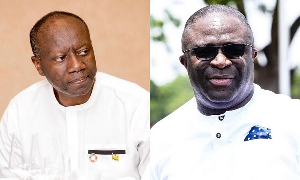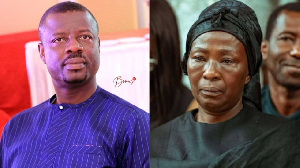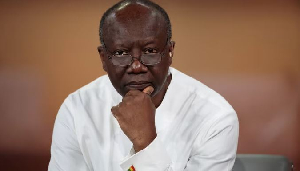By Kwame Okoampa-Ahoofe, Jr., Ph.D.
You see, the New York Times is a global newspaper of record that can almost as easily make or break the fortunes of many a significant personality as well as his/her image. And this largely explains why on June 17, 2008, when the New York Times quoted me in an article on the managerial efficiency, or lack thereof, of Mayor Michael R. Bloomberg, I couldn’t help but feel very important and even significant (See “Bloomberg’s Popularity Survives Darkening Mood of City Poll Finds”). I had been asked to answer a “Yes/No” type of oral questionnaire about how I personally felt New York City’s quite popular and likable Mayor was running the world’s number one city. And as was to be expected, I had said quite a lot in the twenty minutes, or so, that the interview lasted. My opinion, naturally, was neatly, even if somewhat incoherently and sketchily, distilled into two column inches of newsprint. Needless to say, anybody who knows anything about the landmark status and stature of this 19th-century pioneering paper would readily own that even a mere passing mention of one’s name in The Times, as it is affectionately called, is definitely worth all the euphoria and excitement that the subject of such mention may feel.
In the aforesaid interview, which was actually a survey, I was quoted as follows: “‘I like Bloomberg personally, but I may not always agree with his administration,’ said one respondent, Kwame Okoampa-Ahoofe, a 45-year-old Bronx resident who teaches writing at Nassau County Community College.¶ There are quality-of-life issues, like shutting down hospitals rather than looking at how effective they were in serving the people,’ he said. ‘There have been increases in [highway and bridge] tolls. Bloomberg is personable. He knows what he’s doing most of the time. So I somewhat approve and somewhat disapprove. It’s hard to get boxed into yes or no.’”
The last sentence of the foregoing quote is more telling than it actually appears. The point I was trying to make with it regarded the extreme difficulty of subjecting an objectively-minded intellectual, such as I firmly believe that I am, to the all too simplistic, albeit purposely convenient, “Yes or No” formatting of traditional opinion surveys. It was actually this diplomatic expression of disapproval that prompted the voice at the other end of the line promising to follow up with a real intellectually stimulating and conducive interview with me that was geared towards the same purpose or end. That interview, from which the above quote appeared, came a week or two later. At the end of it, the CBS/New York Times interviewer promised to follow it up further with an on-camera television interview in my Bronx apartment. That never happened, however. The basic reason must have been that the pollster/interviewer, perhaps, called several times but my telephone number had been changed to an unpublished number. I had also moved and slightly changed my address; slightly changed my address, because although I had moved into a different apartment building, I still resided in the same cooperative (co-op) apartment complex. Indeed, I had informed the voice at the other end, during the course of our interview, that I was in residential transition.
In the wake of Prof. John Evans Atta-Mills’ razor-thin presidential election run-off victory over Nana Addo Dankwa Akufo-Addo, the then-ruling New Patriotic Party (NPP) flagbearer, Ms. Lydia Polgreen, of the landmark New York Times, published an article in the latter newspaper captioned “Ghana’s Unlikely Democrat Finds Vindication in Vote” (1/11/09). Not only was such caption patently oxymoronic, the article itself contained several, perhaps unintentional, inaccuracies, the first of which, of course, is the very paradoxical concept of an “unlikely democrat.” For, it goes without saying that when it comes to the fundamentally ideological concept of “Democracy,” there is absolutely no such thing as an “unlikely democrat.” One is either a democrat, ideologically and practically or culturally, or one is simply not – no ifs and buts. And regarding the perennially problematic relationship between ex-President Jeremiah John Rawlings and the people of Ghana, as well as the country itself, there is no question about the fact of Mr. Rawlings, the subject of Ms. Polgreen’s otherwise well-composed political profile, having been an extortionately brutal dictator. Ms. Polgreen, herself, offers the following corroborative observation: “Africa’s vast [political] stage has seen many complex players, but few match the contradictions of Mr. Rawlings, the ruthless military man who seized power at the age of 31 and then oversaw the summary executions of his rivals, only to later usher in a new era of prosperity and democracy.”
The problem here, though, is that not very many Ghanaians can remember the “new era of prosperity and democracy” that the Times’ reporter is alluding to. In reality, for most of the 1990s, Mr. Rawlings bull-headedly presided over an at once vast and unprecedented socioeconomic, cultural and political wasteland. Indeed, so impoverished had Ghanaians become that they even invented a quite curious label called “Rawlings’ Necklace.” The latter was in reference to the commonplace collar-bone protrusion on the body of many an otherwise diligent but abruptly unemployed and underemployed Ghanaian worker who could not get enough to eat. This period also criminally witnessed remarkable numbers of Ghanaians committing suicide, the direct result of not being able to bear the culturally objectionable stigma of avoidable penury. Others who appeared to have been relatively weak-willed simply perished for lack of sustenance.
Ms. Polgreen, however, is dead-on accurate in observing, perhaps, to the horror, anger and outright disgust of his legion fanatical disciples across the African continent and the Diaspora, that the greatest achievement of Ghana’s at once most famous and notorious postcolonial ruler was more in the realm of ideological abstraction than in practical economic and cultural reality. On this score, the New York Times’ scribe writes: “As the first nation in sub-Saharan Africa to win independence, in 1957 from Britain, Ghana was a beacon to black people everywhere. Kwame Nkrumah, the country’s visionary but autocratic post-independence leader, was an icon of anti-imperialism, laying out a Pan-African ideology that reverberates on the continent and beyond to this day.”
But that Mr. Rawlings is actually more of an “impossible democrat” than an “unlikely democrat,” is eloquently borne out by the following broad-daylight confession, as it were, from the horse’s own mouth: “We were forced by the [U.S.] State Department – oh yes, forced – to adopt multiparty democracy.” Which is why Mr. Rawlings was also both luridly and unashamedly able to tell the Times’ Ms. Polgreen that “Ghana’s finest hour” of the “true expression of democracy” was when only the gun-slinging Madman of Dzelukope was the only one who called the shots and determined who lived or died in the country. The truth of the matter is that democracy has taken roots and flourished in Ghana, in spite of, not because of, Mr. Rawlings’ attempt to institutionalize a one-man and one-party dictatorship. If anything at all, it is actually pathological characters like Mr. Rawlings who have stalled the salutary and civilized culture of democratic praxis in Ghana for at least a generation.
To be certain, when he impudently declares that “We were forced by the State Department – oh yes, forced – to adopt multiparty democracy,” the founding-proprietor of the so-called National Democratic Congress (NDC) is only telling half of the story. The fact is that the real heroes of Ghana’s Fourth-Republican democratic dispensation, from incontrovertibly reliable sources, are Messrs. William Jefferson Clinton (a.k.a. Bill Clinton) and Kofi Annan, Ghana’s lone Nobel Peace Prize laureate and, arguably, the greatest and most dynamic Secretary-General of the United Nations Organization (UN). These were the key players primarily responsible in “forcing” Mr. Rawlings and his thuggish henchmen and women to accede to the drafting of a Republican Constitution and the civilized and citizen-centered transfer of power. We have always known this, and we have not hesitated to put the foregoing fact in the public domain. Unfortunately, for some inexplicably curious reason, the myth persists that Mr. Rawlings, somehow, graciously and nobly handed over power to Mr. John Agyekum-Kufuor, after the latter had trounced the now-President Atta-Mills at the polls. On this score, the Times’ Ms. Lydia Polgreen writes: “In 1992, he [Mr. Rawlings] took off his military uniform and ran for president as a civilian. He won two terms, and in 2000, to everyone’s surprise, he willingly stepped aside, his two constitutionally allowed terms spent. The candidate of the center-right New Patriotic Party, John Kufuor, won the election. The Rawlings era was over.”
Actually, almost none of us avid students of postcolonial Ghanaian political history were surprised by Mr. Rawlings’ patently involuntary decision not to call the bluff of the U.S. State Department, by foolishly and stubbornly continuing to hang onto power. About our only surprise regards the incredible extent of Ghanaian national cowardliness which allowed, perhaps, the most under-qualified and unfit Ghanaian citizen to forcibly assume the presidency, and then to drunkenly entrench himself for nearly a generation characterized by abject poverty of both the economy and our moral values, as well as the near-irreparable state of decadence and psychological and intellectual regression.
Ms. Polgreen is dead-on accurate in describing Mr. Rawlings as a man with “huge, meaty hands,” and also “a vast slab of a man, with neck as thick as a tree trunk. Even dressed in a simple linen tunic and loose trousers, he is as imposing as any general festooned with medals and gold-braided epaulets.”
It is almost certain that Ms. Polgreen must have been thinking of Uganda’s President Idi Amin, “The Last King of Scotland,” when she wrote those lines. Nonetheless, those who witnessed the near-apocalyptic emergence of the man on the Ghanaian political scene since 1979, and then on December 31, 1981, looking unhealthily underfed, for an air-force pilot, could not misread the barely veiled metaphorical implications of an abjectly corrupt and nauseatingly self-righteous cynic of a pseudo-politician. Such luridly graphic description could well have been snatched from the mouth of my maternal grandfather, Rev. T. H. Sintim (1896-1982), of Akyem-Asiakwa, in relation to then-Gen. Ignatius Kutu Acheampong and his so-called Supreme Military Council (SMC I).
The Times’ reporter also omitted the significant fact that in 1979 when he toppled the so-called SMC II, Gen. F. W. K. Akuffo, the palace-coup plotter, was in the transitional process of organizing elections and handing over the reins of governance to a civilian government. And so the widely propagated myth about Mr. Rawlings intervening in order to prepare Ghana for democratic governance is absolutely without any historical basis or foundation in truth. Likewise, it is wickedly ironic for Mr. Rawlings to be held up and out as an IMF/World star pupil of the so-called Structural Adjustment Program (SAP) when, in fact, it was President Hilla Limann’s very attempt to introduce the IMF/World Bank’s market-oriented economic policies that prompted the overthrow of his People’s National Party (PNP) by Mr. Rawlings.
Also, the nicknaming of then-Flt.-Lt. Jerry John Rawlings as “Junior Jesus,” was singularly done by the late ex-Washington, DC-based Roman Catholic priest and Howard University graduate, Rev. Father Dr. Vincent Kwabena Damuah (1930-1992), a member of Mr. Rawlings’ Provisional National Defense Council (PNDC), who later had a falling out with Rawlings. And while, indeed, the sobriquet of “Junior Jesus” caught on with a section of the Ghanaian public, it was neither officially endorsed nor approved by the Christian Council of Ghana (CCG). In fact, many devout Ghanaian Christians visibly disdained the very notion of Mr. Rawlings as a Junior Jesus, deeming it to flagrantly verge on the outright sacrilegious.
*Kwame Okoampa-Ahoofe, Jr., Ph.D., Associate Professor of English, Journalism and Creative Writing at Nassau Community College of the State University of New York, Garden City. He is the author of 18 books, including “Dr. J. B. Danquah: Architect of Modern Ghana” (iUniverse.com, 2005). Okoampa-Ahoofe will also be teaching “Autobiographical Writing” in Spring 2009. E-mail: okoampaahoofe@aol.com.
Opinions of Saturday, 24 January 2009
Columnist: Okoampa-Ahoofe, Kwame














